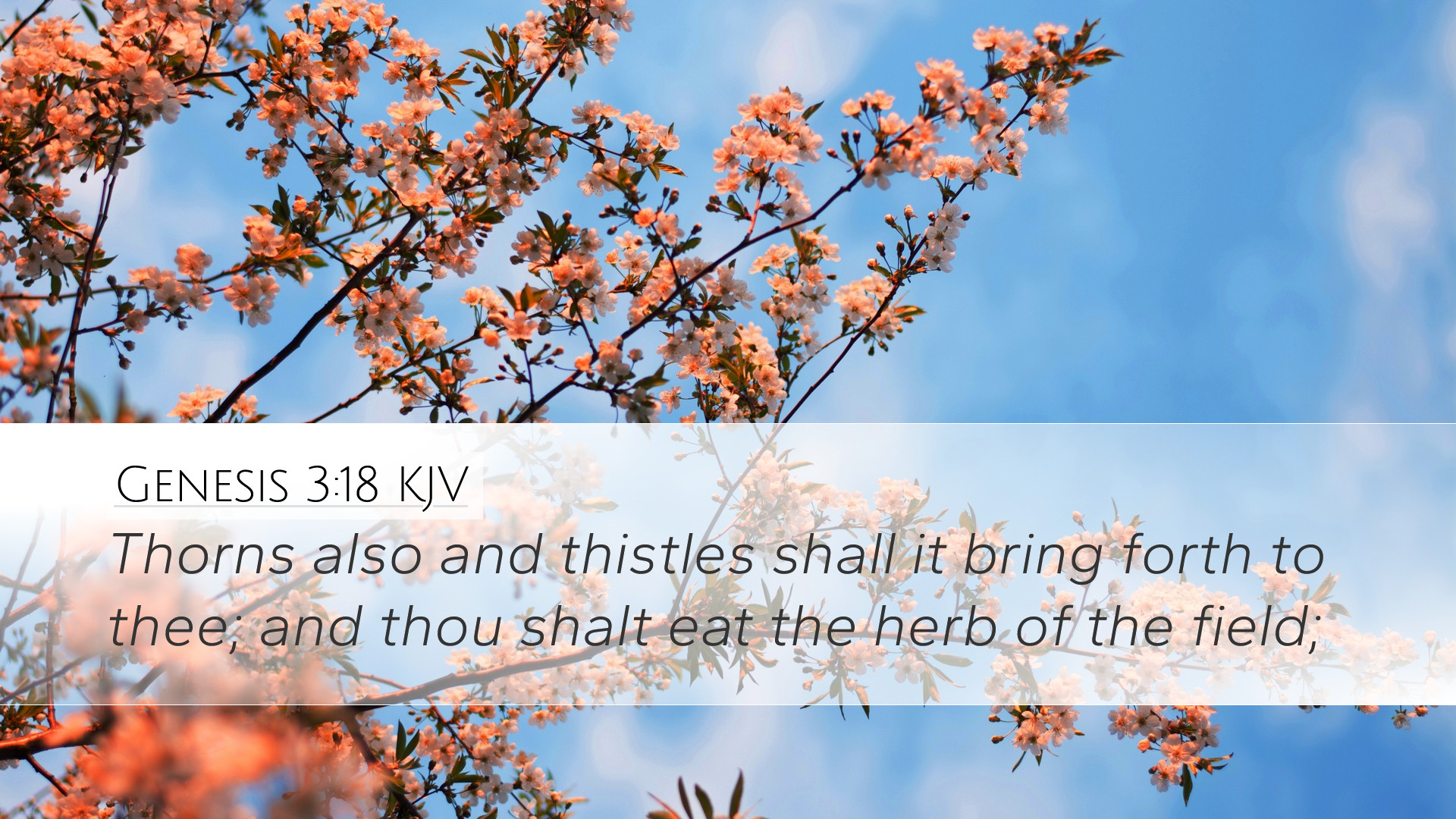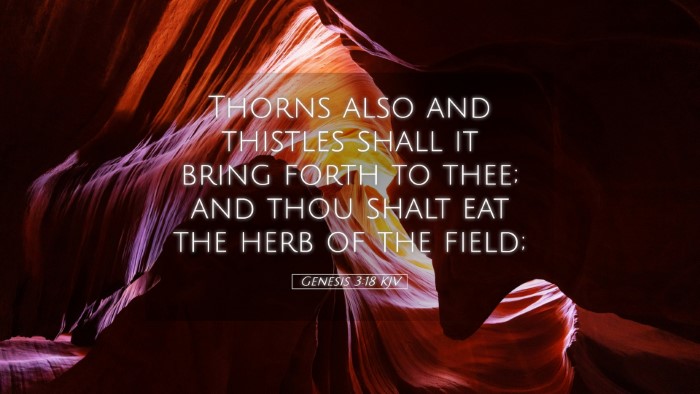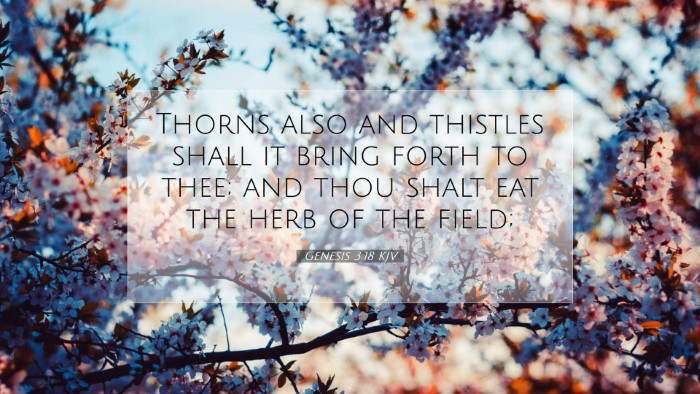Old Testament
Genesis Exodus Leviticus Numbers Deuteronomy Joshua Judges Ruth 1 Samuel 2 Samuel 1 Kings 2 Kings 1 Chronicles 2 Chronicles Ezra Nehemiah Esther Job Psalms Proverbs Ecclesiastes Song of Solomon Isaiah Jeremiah Lamentations Ezekiel Daniel Hosea Joel Amos Obadiah Jonah Micah Nahum Habakkuk Zephaniah Haggai Zechariah MalachiChapter
Genesis 1 Genesis 2 Genesis 3 Genesis 4 Genesis 5 Genesis 6 Genesis 7 Genesis 8 Genesis 9 Genesis 10 Genesis 11 Genesis 12 Genesis 13 Genesis 14 Genesis 15 Genesis 16 Genesis 17 Genesis 18 Genesis 19 Genesis 20 Genesis 21 Genesis 22 Genesis 23 Genesis 24 Genesis 25 Genesis 26 Genesis 27 Genesis 28 Genesis 29 Genesis 30 Genesis 31 Genesis 32 Genesis 33 Genesis 34 Genesis 35 Genesis 36 Genesis 37 Genesis 38 Genesis 39 Genesis 40 Genesis 41 Genesis 42 Genesis 43 Genesis 44 Genesis 45 Genesis 46 Genesis 47 Genesis 48 Genesis 49 Genesis 50Verse
Genesis 3:1 Genesis 3:2 Genesis 3:3 Genesis 3:4 Genesis 3:5 Genesis 3:6 Genesis 3:7 Genesis 3:8 Genesis 3:9 Genesis 3:10 Genesis 3:11 Genesis 3:12 Genesis 3:13 Genesis 3:14 Genesis 3:15 Genesis 3:16 Genesis 3:17 Genesis 3:18 Genesis 3:19 Genesis 3:20 Genesis 3:21 Genesis 3:22 Genesis 3:23 Genesis 3:24


Commentary on Genesis 3:18
Verse Content: "Thorns also and thistles shall it bring forth to thee; and thou shalt eat the herb of the field."
Introduction
This verse comes from the narrative of the Fall, where God declares the consequences of Adam and Eve's disobedience. In the context of Genesis 3, God addresses Adam directly concerning the curse on the ground and its implications on humanity’s labor and sustenance.
Exegesis of Genesis 3:18
The statement, “Thorns also and thistles shall it bring forth to thee,” reflects a drastic alteration from the original flourishing creation intended by God. Before the Fall, the garden provided grace bountifully, but now, as a result of sin, the earth responds with suffering and struggle.
Matthew Henry's Insights
Matthew Henry reflects on the implications of thorns and thistles being introduced into the world. He notes that these plants symbolize the hardships and tribulations that would now characterize human existence. The ground, which was once a source of joy and ease, becomes a place of labor and toil. He emphasizes that the enjoyment of labor is now tainted by its difficulty, alluding to a broader theological claim about the nature of a fallen world.
Albert Barnes' Perspective
Albert Barnes discusses the significance of the curse placed upon the earth. He elucidates that this curse indicates a shift in the divine order — labor becomes more arduous, and prosperity in farming is now met with challenges. Barnes points out that the mention of “thorns and thistles” signifies not only physical toil but also implies spiritual barrenness and struggle in a post-Eden world. He associates the hard labor of farming with the spiritual struggle that humanity faces in seeking a relationship with God.
Adam Clarke's Commentary
Adam Clarke offers a detailed exploration of the Hebrew terms used in this verse. He notes that “thorns” and “thistles” can be seen as representations of both physical suffering and sin that would be manifest in the world. Clarke emphasizes that the work done by man would now be met with obstacles, which symbolize the distance from God and the resulting hardship in all areas of life. He interprets this verse as a reminder of the need for grace in redeeming the labor of humanity’s hands.
Theological Implications
Genesis 3:18 serves as a critical point in understanding the doctrine of original sin and the resulting condition of humanity. The introduction of thorns and thistles signifies a world that is not as it should be — full of chaos and disorder. This can lead to a greater exploration of the nature of suffering, work, and redemption in Christian thought.
Human Labor and Redemptive Work
Pastoral reflections often pull from this verse to discuss the nature of work in the life of Christians. It invites a discussion about how work, which is part of God's original plan, has been marred by sin yet retains a redemptive quality. The hardships might lead individuals to Christ, who offers rest and restoration from the struggles of this life.
Hope Amidst Labor
The presence of thorns also participates in the narrative of hope. Clarke would argue that even in the struggle, there lies the opportunity for faith that produces perseverance and character. This duality is significant for believers as they navigate a world filled with challenges, reminding them of the importance of relying upon God for strength in their toil.
Application for Pastors and Theologians
For pastors, Genesis 3:18 can serve as a powerful teaching point about the nature of sin and its consequences but also about the grace and restoration available through Christ. The thematic elements of labor can be linked to stewardship, encouraging congregations to approach their work, both spiritual and secular, with the knowledge of God’s providence and their calling.
Theologians can delve deeper into implications that this verse has on humanity's condition, addressing topics of original sin, theodicy, and suffering within the overarching narrative of scripture. Discussions around redemptive history can also take root here, emphasizing how God intervenes in the human struggle post-Fall.
Conclusion
Genesis 3:18 stands as a profound reminder of the reality of a fallen world and the struggles that accompany human labor. The integration of insights from commentators such as Matthew Henry, Albert Barnes, and Adam Clarke provides depth to our understanding of this verse. It beckons readers — pastors, students, theologians, and scholars alike — to recognize the implications of sin while holding fast to the hope found in divine redemption through Christ.